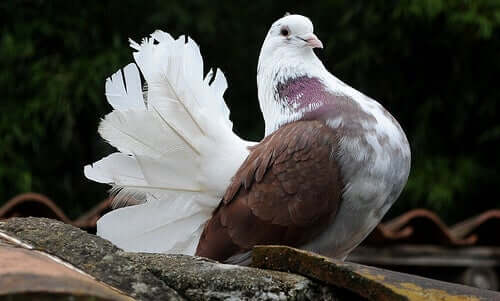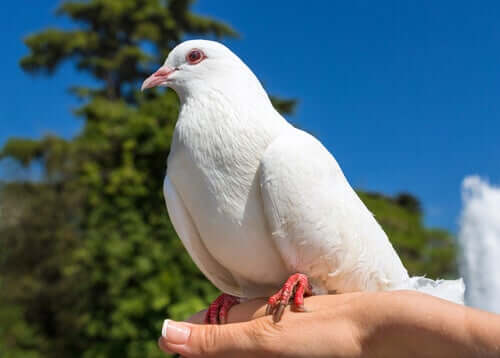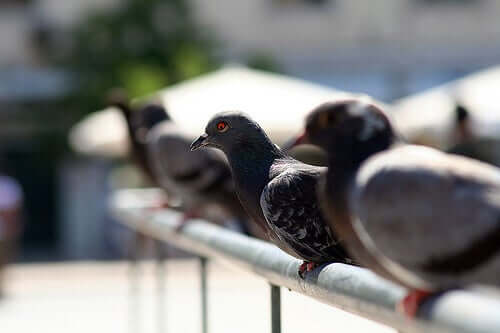Dove Care - How to Keep Them Happy

The relationship between human beings and pigeons (or doves) is currently somewhere between love and hate. While some want to keep a dove as a pet and care for them, others are afflicted by columbiphobia (the fear of doves or pigeons).
Origin and adaptation
The term “dove” is generic and refers to any of the more than 300 species that comprise the Columbiform family. They’re direct relatives of the turtledoves and there’s a huge variety of species.
The gray-colored pigeon doves are the most common ones in our streets. Also, they comprise the majority of carrier doves and domestic pigeons.

Their bodies adapted to big cities and the food changes modified their bodies. Because of that, it’s now highly vulnerable to the spreading of parasites.
The dove’s body is similar to that of parrots and other birds. It’s clean and healthy when properly cared for. However, it becomes a source of disease when exposed to contaminated environments.
Their looks and diverse characters have turned these birds into a hobby for many people. This is because their beauty and the ease of teaching them is very attractive to some people.
Keep in mind that they can only develop their skills when they feel healthy and safe. So, dove care is a good investment for your health and for their training.
Dove care – basic tips
These tips for dove care are just a summary of the main preventive measures to preserve the health of the animals and their environment.
Hygiene
Doves or pigeons are no dirtier than other animals. In fact, every animal that comes into contact with microorganisms can house parasites in their bodies, including humans.
Actually, all birds have a tendency for cleanliness but are quite vulnerable to infections by internal and external parasites. These microorganisms easily reproduce in cages, accessories, and other objects around your home.
You must clean their houses or cages 2 to 3 times a week. We also recommend removing and sanitizing the excrement tray every day.
Also, you must prevent the accumulation of food debris, and, above all, thoroughly clean any droppings at the bottom of the cage and in their trough. You must wash and disinfect everything in it to keep fungi and bacteria at bay.
In addition, make it a habit to check their legs and feathers frequently. Consult a vet who specializes in birds immediately if you notice any wounds, or changes in color, texture, and appearance.
Feeding
A balanced diet is the best way to take care of your doves and prevent disease. Having all the daily nutrients they need will allow them to properly develop their immune system and reject nasty microorganisms.
The optimal diet of a pigeon must contain a variety of grains to provide fat, carbs, and proteins. There are some balanced mixtures available for purchase at your local pet shops.
You can also opt for homemade food mixes; these must contain corn, sorghum, oats, wheat, barley, rice, lentil, carob, flax, beans, and sunflower seeds.
Baby pigeons usually eat porridge fed to them with droppers or syringes.
Offer small pieces of mixed fruits, vegetables, grains, and seeds once a week. The food must be fresh and in good condition.
Diet no-nos

- Highly processed and seasoned commercial food such as sausages and fried goods
- Chocolate and candy
- Coffee and any other products that contain caffeine
- Whole milk and dairy
Dove care – conditioning the environment
Pigeons can live out of cages when they’re well trained but you should still provide them with some sort of dovecotes. It’ll be their home – the place where they’ll be able to feel safe and rest. This is why it’s very important to put some thought into their selection.
Ideally, cover the bottom of their cages with newspapers and gravel. You should also have straw for their nests.
The feeders and drinkers must be size appropriate and suitable for the shape of the animal. That way you’ll be able to prevent constant spills and future contamination.
Also, the location must allow for normal growth – don’t even think of leaving them outdoors. This is because exposure to extreme temperatures could lead to subsequent illness and even death.
These birds thrive in warm, temperate climates. So, you must provide some heating during the winter, and you should maintain a temperature of about 71-72°F.
